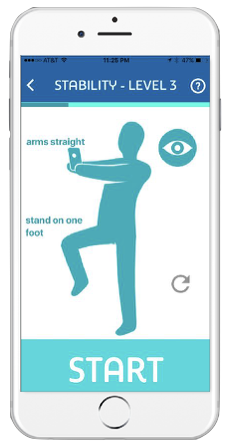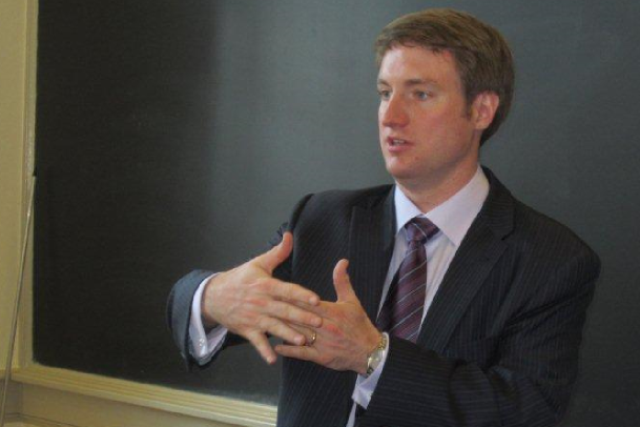Alumnus rises to the challenge of helping seniors avoid falls
Every 19 minutes, a person over age 65 in the U.S. dies due to a fall. The leading cause of death among older Americans, falls result in 800,000 hospitalizations and $31 billion in health care costs each year, according to the National Council on Aging.
Motivated by those hard facts, Edward Likovich, A.B. ’06, S.M. ’08, Ph.D. ’11, vice president of operations at Nymbl Science, is spearheading the use of software to provide a solution. Nymbl has developed a mobile app-based evaluation and training system to help seniors understand and improve balance.
“Every senior knows their cholesterol, weight, and blood pressure, but when you ask them about their balance, which is a huge health risk, their response is either ‘good,’ ‘bad,’ or ‘I don’t know,’” Likovich said. “The Nymbl system quantifies balance into a number, so everyone is speaking the same language.”
 By tracking an individual’s balance over time, Nymbl’s assessment tool makes it easier to identify deterioration. The assessment is paired with balance exercises and mental challenges to help seniors maintain and improve balance as they age. The program involves increasingly difficult physical exercises, like lunges, tandem walks, and squats, which are performed simultaneously with brain games like trivia, color matching, word scrambling, and math problems.
By tracking an individual’s balance over time, Nymbl’s assessment tool makes it easier to identify deterioration. The assessment is paired with balance exercises and mental challenges to help seniors maintain and improve balance as they age. The program involves increasingly difficult physical exercises, like lunges, tandem walks, and squats, which are performed simultaneously with brain games like trivia, color matching, word scrambling, and math problems.
Neural pathways deteriorate as individuals age. As a result, seniors are more likely to lose balance when their minds are distracted or pre-occupied during movement. Improving brain plasticity and re-engaging neural pathways goes a long way toward helping an older person avoid falls, Likovich said.
For Likovich, who studied physics as an undergrad and applied physics for his master’s and Ph.D. at the John A. Paulson School of Engineering and Applied Sciences, joining Nymbl offered an ideal outlet for the problem-solving mind of a materials science researcher. As a Ph.D. candidate, he worked with advisor Venky Narayanamurti, Benjamin Peirce Research Professor of Technology and Public Policy, to explore the electrical properties of aluminum-doped zinc oxide, and the implications of this new material for solar cells.
In the study of physics, he found a field that satisfied his desire to explore creative solutions to exciting problems.
“When you get to the frontier of it, physics is an art,” he said. “Here is something new that no one knows anything about. How are we going to approach it from as many different angles as possible? You have a collaborative team working on a problem that no one had worked on before.”
After earning his Ph.D., Likovich applied his collaborative capabilities in a completely different realm: finance. At J.P. Morgan Chase, he worked with a high-frequency trading team that used complex math and algorithms to squeeze microseconds out of trade execution speeds.
Medical technology may seem far removed from the physics lab and Wall Street, but Likovich felt inspired to shift gears and apply lessons learned from both experiences to help people.

As VP of operations at a firm with only four full-time employees, Likovich does a little bit of everything, such as talking to early customers, working with developers, refining business models, and helping raise capital from investors. One of the biggest challenges he faces is identifying the right partners and business model for Nymbl, since there are a seemingly endless number of players and stakeholders in the health care world.
“There’s a balance between developing a tool completely versus moving fast,” he said. “There is always a tension between releasing software quickly and making sure everything we are doing is research-based and validated, especially in a health care setting where you have to get things right.”
It is especially challenging to find that balance while exploring opportunities for growth, Likovich said. Nymbl has already released its product into the independent living market, and is looking to enter other markets, such as physical therapy, primary care, and home health care, on their way toward achieving the firm’s mission of preventing one million falls.
The prospect of that growth, and the opportunity to improve the quality of life for millions of seniors, motivate Likovich and his colleagues to keep going.
“We are creating something from scratch that can save lives, so it is all hands on deck,” he said. “But to have seniors say ‘thank you’ for the work we are doing to help a population that is oftentimes forgotten is incredibly rewarding.”